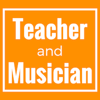Teacher and Musician Challenge 5
One of the nice things about the final half term of the year is that you can use your gained time to observe other teachers and learn from what they do. If you’re in a two-person (or more) music department then this works just as well for music as any other subject. Not so true if you’re one of the many solo music teachers out there. This week’s challenge is an attempt to make up for this and gain some of the benefits of observation from your own lessons.
The challenge: observe yourself
The observe yourself challenge is relatively simple, you just need to find a way of standing back from what you’re doing long enough to ask yourself
why you made the decisions that you did. There are many ways you can achieve this, three possibilities are:
- video record the lesson
- during the lesson, keep a list of every decision you make
- get a pupil or teaching assistant to keep the list for you
The first option above is really effective as it’s a great way of remembering exactly what was going on but the different perspective will help you to be a little more distant. You do, of course, run the risk of pupils ‘playing up’ to the camera but this is likely to become less of an issue as
CPD tools such as IRIS Connect become more prevalent in schools (for better or worse).
I’m quite fond of the list-keeping options above the video recordings as it means I have to remember the decision itself (especially if you ask someone else to take the list). Music teachers make innumerable decisions during a lesson and many of them are automatic. Looking at a list and trying to identify why you controlled behaviour with ‘teacher eyes’ rather than a verbal warning gives you the chance to ask yourself both
why you made that decision and
if it was the right decision to make.
‘Observe yourself’ is really just a gimmicky way of saying ‘reflect on your teaching’ but this reflection is focused entirely on your decision making rather than your planning, marking or pace. Of course, it’s nowhere near as good as getting yourself into another teacher’s classroom but it can be a great tool to inform a future discussion (or blog post!).

